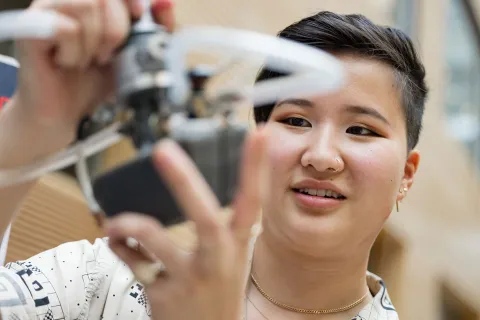Here are some key differences between science and engineering, to help choose the best path for you.

Your high school education has likely included lots of science courses – physics, chemistry and biology. But you’ve probably not taken any engineering classes. That can make it hard to know whether engineering or science is the better choice for your undergraduate degree.
However, the good news is that if you enjoy your science and math classes and have a passion for problem-solving, you’ll likely enjoy engineering as well! But as you can read below, there are some key differences between science and engineering.
For example, a scientist might collect and analyze water in a remote community to see if it is safe to drink. An engineer would use the collected data to develop chemical, biological or physical water treatment options that could work within various economic or physical constraints. The engineer would then prototype and test the proposed solution, and implement it in partnership with the community so that community members can access clean, safe drinking water. (And if you want to consider the whole picture, it was likely an engineer that initially designed the water quality testing equipment!)
Engineers can start working in their field right away
Graduating with a science degree gives you many career options. You can look for work in your field or pursue a graduate degree. If you’re interested in working in a profession where you’ll use your knowledge of science – becoming a doctor, dentist or pharmacist, for example – you’ll need to continue to apply to a professional degree program and complete further education.
An undergraduate engineering degree is a professional degree (at UBC, engineers graduate with a Bachelor of Applied Science). This means you can start working in your area right after your graduate (and even gain some experience as an undergraduate, if you do co-op) without investing further time and money in another post-secondary credential.
Of course, you can also pursue graduate school in engineering or enter other professional degree programs such as medicine or law. Many engineers go on to start their own businesses or become leaders of companies (check out our article Engineers Make Great Leaders to learn some of the reasons why more Fortune 500 companies are led by engineers than people with any other degree).
UBC Engineering prepares you to excel and make an impact
Take a look at the foundational first-year courses you’ll take at UBC Engineering and you’ll see some familiar subjects. You’ll be taking physics, chemistry, biology and calculus, as well as a course focusing on engineering and an elective. Your science and math courses are taught through an engineering lens, meaning that the examples and projects you’ll study will be directly relevant to engineering classes.
The degree you’ll graduate with says it all: a Bachelor of Applied Science tells others that you have the skills to apply your knowledge of science to make the world a better place.








